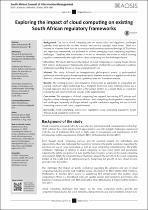 ResearchSpace
ResearchSpace
Exploring the impact of cloud computing on existing South African regulatory frameworks
JavaScript is disabled for your browser. Some features of this site may not work without it.
- ResearchSpace
- →
- Research Publications/Outputs
- →
- Journal Articles
- →
- View Item
| dc.contributor.author |
Mohlameane, M

|
|
| dc.contributor.author |
Ruxwana, Nkqubela

|
|
| dc.date.accessioned | 2021-01-17T15:57:22Z | |
| dc.date.available | 2021-01-17T15:57:22Z | |
| dc.date.issued | 2020-08 | |
| dc.identifier.citation | Mohlameane, M. & Ruxwana, N. 2020. Exploring the impact of cloud computing on existing South African regulatory frameworks. South African Journal of Information Management, vol. 22, no. 1, pp9 | en_US |
| dc.identifier.issn | 1560-683X | |
| dc.identifier.issn | 2078-1865 | |
| dc.identifier.uri | http://www.scielo.org.za/scielo.php?script=sci_arttext&pid=S1560-683X2020000100011 | |
| dc.identifier.uri | doi.org/10.4102/sajim.v22i1.1132 | |
| dc.identifier.uri | http://hdl.handle.net/10204/11719 | |
| dc.description | Copyright: © 2020. The Authors. Licensee: AOSIS. This work is licensed under the Creative Commons Attribution License | en_US |
| dc.description.abstract | The use of cloud computing services raises policy and regulatory challenges globally, more specifically on data security and privacy, amongst other issues. There is a concern on whether South African information and communications technology (ICT) policies and regulatory frameworks are sufficient to address emerging cloud computing regulatory challenges. Therefore, this necessitates a review to determine the extent to which existing regulatory frameworks are applicable to cloud computing and the challenges thereof. The study determines the impact of cloud computing on existing South African ICT policies and regulatory frameworks and ascertains whether they are sufficient to address challenges regarding the use of cloud computing services. The study followed an interpretivism philosophical stance. A multi-method qualitative research approach was employed and a thematic analysis was applied in which the data was collected through interviews, questionnaires and document analysis. The existing policies and regulatory frameworks as applicable to computing are playing 'catch-up' where technology has a footprint. Moreover, some existing policies use a blanket approach and are not specific to the subject matter. As a result, there is a need for policies that are future-proof and specific to the subject matter. The emergence of cloud computing has exposed the existing ICT policies and regulatory laws as being inadequate to address cloud computing developments, complexities and challenges, especially challenges related to public confidence regarding the use of cloud computing services and cloud competitiveness. | en_US |
| dc.language.iso | en | en_US |
| dc.publisher | AOSIS Publishing | en_US |
| dc.relation.ispartofseries | Workflow;23952 | |
| dc.subject | Cloud computing | en_US |
| dc.subject | Cloud computing regulatory | en_US |
| dc.subject | South African cloud regulatory framework | en_US |
| dc.subject | ICT policies | en_US |
| dc.title | Exploring the impact of cloud computing on existing South African regulatory frameworks | en_US |
| dc.type | Article | en_US |
| dc.identifier.apacitation | Mohlameane, M., & Ruxwana, N. (2020). Exploring the impact of cloud computing on existing South African regulatory frameworks. http://hdl.handle.net/10204/11719 | en_ZA |
| dc.identifier.chicagocitation | Mohlameane, M, and Nkqubela Ruxwana "Exploring the impact of cloud computing on existing South African regulatory frameworks." (2020) http://hdl.handle.net/10204/11719 | en_ZA |
| dc.identifier.vancouvercitation | Mohlameane M, Ruxwana N. Exploring the impact of cloud computing on existing South African regulatory frameworks. 2020; http://hdl.handle.net/10204/11719. | en_ZA |
| dc.identifier.ris | TY - Article AU - Mohlameane, M AU - Ruxwana, Nkqubela AB - The use of cloud computing services raises policy and regulatory challenges globally, more specifically on data security and privacy, amongst other issues. There is a concern on whether South African information and communications technology (ICT) policies and regulatory frameworks are sufficient to address emerging cloud computing regulatory challenges. Therefore, this necessitates a review to determine the extent to which existing regulatory frameworks are applicable to cloud computing and the challenges thereof. The study determines the impact of cloud computing on existing South African ICT policies and regulatory frameworks and ascertains whether they are sufficient to address challenges regarding the use of cloud computing services. The study followed an interpretivism philosophical stance. A multi-method qualitative research approach was employed and a thematic analysis was applied in which the data was collected through interviews, questionnaires and document analysis. The existing policies and regulatory frameworks as applicable to computing are playing 'catch-up' where technology has a footprint. Moreover, some existing policies use a blanket approach and are not specific to the subject matter. As a result, there is a need for policies that are future-proof and specific to the subject matter. The emergence of cloud computing has exposed the existing ICT policies and regulatory laws as being inadequate to address cloud computing developments, complexities and challenges, especially challenges related to public confidence regarding the use of cloud computing services and cloud competitiveness. DA - 2020-08 DB - ResearchSpace DP - CSIR KW - Cloud computing KW - Cloud computing regulatory KW - South African cloud regulatory framework KW - ICT policies LK - https://researchspace.csir.co.za PY - 2020 SM - 1560-683X SM - 2078-1865 T1 - Exploring the impact of cloud computing on existing South African regulatory frameworks TI - Exploring the impact of cloud computing on existing South African regulatory frameworks UR - http://hdl.handle.net/10204/11719 ER - | en_ZA |





